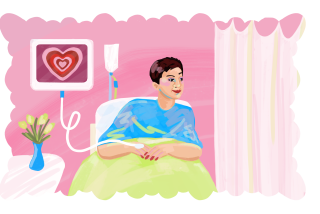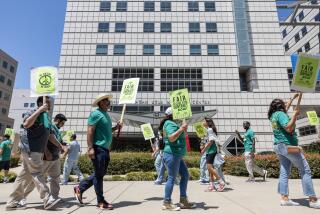Feeling foolish but healthier
I’d like to pretend that I checked into UCLA’s new hospital Friday on an undercover mission, to check out patient care at the $800-million medical showpiece.
But the truth is, I spent much of my weekend there, hooked up to monitors and IVs, because I thought I was having a heart attack.
For two days, I had tried to ignore the tightness in my chest, dizziness and unrelenting fatigue. But when I had to stop and lean against a tree to catch my breath on a short walk across the UCLA campus, I realized that something serious might be wrong.
Yet I got in my car and started toward downtown, trying to brush off the feelings. I had a column to write, a deadline to meet. I could always stop at the hospital on my way home from work if I still felt bad. Then I imagined my three daughters motherless -- lost, hurt and angry at my stupidity. I whipped a U-turn on Westwood Boulevard and headed back to the Ronald Reagan Medical Center.
The hospital -- eight years in the planning and open for two weeks -- has been hailed for its beauty, creature comforts and new-age technology. “A masterful piece of light, nature and scale,” The Times’ former architecture critic put it; a place where architecture can help heal “the human psyche.”
My psyche didn’t appreciate the expansive views or Italian travertine. I wanted better directions and bigger signs as I wandered, clutching my chest, through its halls and lobbies.
Once I found the emergency room, it took minutes for the triage team to settle me on a gurney and hook me up to an electrocardiogram machine. The squiggly lines on the monitor looked fine to me. I breathed a sigh of relief and mentally prepared to leave.
What I didn’t know is that “chest pain” not only whisks you to the head of the emergency room line, but sets in motion a series of blood tests, X-rays and monitoring that can make an overnight stay a necessity.
Chest pains can mean many things, Johanna Bruner, the hospital’s head of emergency room and cardiology services, told me Monday. The effectiveness of treatment depends on the quality of the diagnosis.
Describe your symptoms. Rate your pain on a scale of 1 to 10. Do you smoke, drink? What medications are you taking? Did anyone in your family have heart disease?
I got the same set of questions four times in three hours, from young doctors-in-training who reminded me of my overachieving oldest daughter -- earnest, conscientious, determined not to make an error. This is a teaching hospital, after all. These young women were learning, and I was their assignment.
For me, it was the nurses who made the difference -- their cheerful attitudes and nonstop smiles; a heated blanket when I was cold and scared; their help untangling me from the mess I’d made of IV tubes and monitor wires.
Thank you, Fidel, for adjusting my potassium drip again and again so that my arm would stop burning like it was on fire.
Thank you, Mike, for unhooking my monitors and tying my gown so I could make my way to a private bathroom alone.
Thank you, Caroline, for sitting with me when I cried, telling me about your children and letting me talk about mine. You made me feel like everything would be all right.
It wasn’t a heart attack after all. My blood pressure was high, my potassium low and my heart was skipping beats because of something called premature ventricular contraction -- common among people over 40, and often brought on by too little sleep, too much coffee, a rush of stress or anxiety.
It’s hard not to feel foolish, guilty even, when you suck up so many hospital resources and then find out there is nothing seriously wrong.
But UCLA’s Bruner says that’s dangerous thinking: “Better you feel foolish than have it be something serious and not have come,” she said. “If you have the slightest inkling of ‘I don’t know what this is, but I know something’s wrong,’ better you come and get it checked out.”
My symptoms fit the mold for a woman in cardiac arrest. Seventy percent of women never have the sort of chest pains considered the classic symptom of heart attacks in men. We’re more apt to feel shortness of breath, weakness, dizziness and unusual fatigue. And we often tend to dismiss those feelings. Women who have heart attacks in their 40s and 50s are twice as likely to die from them as men in the same age group, according to a study published in the New England Journal of Medicine.
I left with orders for further tests, a handful of prescriptions and instructions to rest more, drink less coffee and stop arguing with my kids.
On Saturday, I’ll be back with the column I intended to write last week.
Right now, I’m going to close my bedroom door and take a nap.
--


